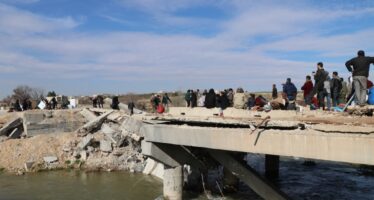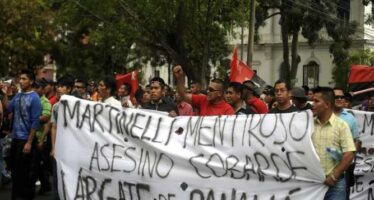Turkey and Israel Reconcile Amid PKK Peace Promise
![]()

Palestinians walk past a statue erected as a memorial for the victims of the Turkish flotilla Mavi Marmara in the port of Gaza City on 23 March 2013. (Photo: AFP – Mahmud Hams)
By: Hüsnü Mahalli
Published Monday, March 25, 2013
What will a Turkish-Israeli reconciliation mean for Syria? As Israel concedes wrongdoing on the Mavi Marmara, does this signal further alignment on Syria aims? Throw PKK head Abdullah Öcalan’s recent announcement to halt armed activities against Turkey in the mix and the ramifications for Syria are tremendous.
Last week was full of dramatic events, which will continue to impact the situation in Syria and the region. Two days following the election of Ghassan Hitto, a Kurd with a US passport, to head the “interim Syrian government,” the leader of the Kurdistan Workers’ Party (PKK) Abdullah Öcalan announced the cessation of armed activities against Turkey. His move is further indication of the strategic and tactical link between the events.
It seems that PKK fighters, whom Öcalan asked to leave Turkey under formal guarantees from Turkish PM Recep Tayyip Erdogan, will be heading to Syria to support the Kurdish militias.
Erdogan was quick to reconcile and ally himself with Öcalan to achieve more of his regional aims. These actions prompted confusion on behalf of Turkish nationalists who could not find a logical reason for the reconciliation between Erdogan and Öcalan.
Turkish media, meanwhile, are discussing some dramatic scenarios, including an agreement between Ankara and Washington to redraw the map of the region, like the British-French 1916 Sykes-Picot Agreement.
Erdogan and his foreign minister Ahmet Davutoglu wanted to leave behind all these complex calculations by strengthening their alliance with the US. This meant a reconciliation with Tel Aviv, according to the conditions set during US Secretary of State John Kerry’s latest visit to Ankara.
This could be the reason behind last week’s backtracking by Erdogan on his former statements on Zionism, announcing that he had not meant what he said and that he is neither against Judaism nor Zionism, but opposed to the policies of Israel concerning the rights of Palestinians.
This new position was enough for US President Barack Obama to convince Israeli PM Benjamin Netanyahu to call Erdogan and apologize for the Israeli army’s actions against the Mavi Marmaraship in May 2010. But Netanyahu only gave verbal promises about lifting the siege on Gaza, which was the third fundamental condition set by Turkey for reconciliation with Israel.
However, these indicators are not the only reason for Israel’s apology to Turkey. Ankara does not hide its dire need for the support of the Jewish Lobby in the US, which had threatened to sabotage Erdogan’s visit to Washington at the end of this month unless he reconciles with Tel Aviv.
It is expected that the reconciliation will be reinforced with a surprise visit to Ankara by Netanyahu very soon and before Erdogan’s visit to the US.
It has now become clear that, in the next few days, the Syrian regime will be facing more political and military pressures on the Arab, regional, and international levels, as a result of the Turkish-Israeli-US alliance and its Qatari and Saudi extensions. Erdogan will attempt to include Syrian Kurds in the mix, based on his deal with Öcalan, whose terms of agreement are still unknown.
Turkish media, meanwhile, are discussing some dramatic scenarios, including an agreement between Ankara and Washington to redraw the map of the region, like the British-French 1916 Sykes-Picot Agreement. This will give the Kurds a regionally independent entity through a federation of Kurdish regions in Iraq, Syria, Turkey, and Iran. It might even be under the protection of the Islamic Ottoman Erdogan, as mentioned by Öcalan in his statements commemorating Nowruz, when he spoke about the Ottoman Islamic brotherhood.
This article is an edited translation from the Arabic Edition.
Related Articles
Mas allá del coronavirus – Newsorund/2
![]()
La baja cotización del petróleo. La decisión de Argentina paraliza el MERCOSUR. Turquía y HTŞ se reúnen. El presidente turco Tayyip Erdogan fue a Moscú
A propósito de la reciente demanda contra Panamá ante el CIADI: breves apuntes
![]()
El pasado 15 de abril, se registró formalmente ante el Centro Internacional de Arreglo de Disputas entre Inversionista Extranjero y Estado (CIADI) una nueva demanda contra Panamá
Crackdown in Bahrain: Notes from the field
![]()
Despite the protests, the Al Khalifa family does not look like it will be dethroned, but that may come with




